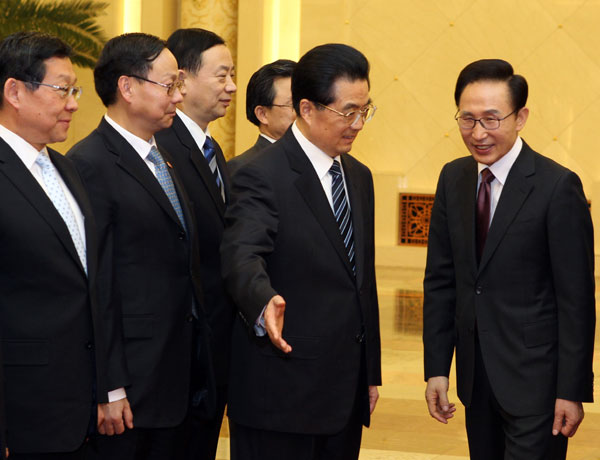President Hu stresses efforts for peace
Updated: 2012-01-10 07:20
(China Daily)
|
||||||||
 |
|
President Hu Jintao and senior officials welcome Lee Myung-bak, president of the Republic of Korea, in Beijing on Monday. Lee is on an official three-day visit to China.[Wu Zhiyi / China Daily] |
BEIJING - President Hu Jintao urged all parties concerned to work for peace and stability on the Korean Peninsula as he met with Lee Myung-bak, president of the Republic of Korea (ROK), in Beijing on Monday.
The two leaders met for the first time since December's change in leadership in the Democratic People's Republic of Korea (DPRK).
During the meeting, which lasted more than 90 minutes, Hu said that all parties concerned should be interested in safeguarding peace and stability on the peninsula.
China is willing to make any effort to achieve this, he said.
"China will continue to support the improvement of relations, through dialogue, between the DPRK and the ROK."
China hopes the parties concerned will contribute more initiatives that help promote peace and stability on the peninsula, he said.
Stressing that it is the shared goal of the ROK and China to realize the denuclearization of the peninsula and safeguard its stability, Lee told Hu that the ROK appreciates China's efforts and hopes that China will continue to play a positive role.
Analysts said that the consensus reached between Chinese and ROK leaders sets the tone for future coordination on peninsula affairs.
Yet analysts warned that regional countries must proceed with caution in a highly sensitive climate.
"It is important for Chinese and ROK leaders to communicate face-to-face, especially as the DPRK experienced the unexpected leadership transition. Lee's visit certainly enhances mutual political trust and pushes forward peace on the peninsula," Liu Jiangyong, vice-dean of the institute of modern international relations at Tsinghua University, said.
"The vision adopted by the two leaders has laid a keystone for further development in China-ROK ties and an improvement in DPRK-ROK ties," Liu said.
The ROK has said its primary foreign policy goal this year is maintaining stability on the peninsula.
Lee certainly hopes China exerts influence on the DPRK, according to Zhang Liangui, a professor of international strategic research at the Party School of the Central Committee of the Communist Party of China.
Yet China is clear that it has limited influence and is unwilling to interfere too much in the domestic affairs of the DPRK.
In another move to help ease the situation, the ROK's top nuclear envoy will meet his Chinese counterpart in Beijing to discuss the peninsula's nuclear issue, Yonhap News Agency reported.
Lim Sung-nam will hold talks with Wu Dawei, China's special representative for Korean Peninsula affairs, on denuclearization.
Talks on the DPRK nuclear program, involving the ROK, the DPRK, China, Japan, the United States and Russia, have been stalled since 2009.
Lee's three-day visit, which began on Monday, will also see Lee meeting with Premier Wen Jiabao on Tuesday and Chinese businessmen as the two countries celebrate the 20th anniversary of the establishment of diplomatic ties.
The relationship with China is one of the most important for the ROK, Lee said on Monday.
In May 2008 the two leaders agreed to upgrade bilateral ties to a "strategic partnership" to expand their cooperation in a number of areas such as the economy, security, cultural and international issues.
The visit will also help mend frayed relations over fishing fleet incursions in disputed waters.
According to the Yonhap News Agency, the leaders agreed to strive to prevent the recurrence of incursions in December which led to the death of an ROK coast guard officer.
FTA talks
The ROK decided to take legal "domestic steps" to initiate official negotiations over a free trade pact with China, the Korea Herald quoted a Seoul official as saying on Monday.
According to Yonhap, once Seoul completes domestic procedures, it is possible that the two sides could announce the start of formal trade talks in the first half of this year.
For Seoul to launch any official free trade agreement (FTA) negotiations with a foreign country, it must first go through a set of local procedures stipulated in a presidential rule, including public hearings on the FTA.
However, the official said he cannot rule out a delay in launching free trade talks with China if exploratory talks to set parameters for any deal hit a snag or the move faces local resistance.
China is the largest buyer of ROK-made goods and has contributed to Seoul's sizable trade surplus in recent years, while the ROK is China's third-largest trading partner after the United States and Japan.
During the Monday talks, Hu said China expected more ROK firms to invest in China and play a role in economic restructuring and industrial upgrading.

 Relief reaches isolated village
Relief reaches isolated village
 Rainfall poses new threats to quake-hit region
Rainfall poses new threats to quake-hit region
 Funerals begin for Boston bombing victims
Funerals begin for Boston bombing victims
 Quake takeaway from China's Air Force
Quake takeaway from China's Air Force
 Obama celebrates young inventors at science fair
Obama celebrates young inventors at science fair
 Earth Day marked around the world
Earth Day marked around the world
 Volunteer team helping students find sense of normalcy
Volunteer team helping students find sense of normalcy
 Ethnic groups quick to join rescue efforts
Ethnic groups quick to join rescue efforts
Most Viewed
Editor's Picks

|

|

|

|

|

|
Today's Top News
Health new priority for quake zone
Xi meets US top military officer
Japan's boats driven out of Diaoyu
China mulls online shopping legislation
Bird flu death toll rises to 22
Putin appoints new ambassador to China
Japanese ships blocked from Diaoyu Islands
Inspired by Guan, more Chinese pick up golf
US Weekly

|

|







